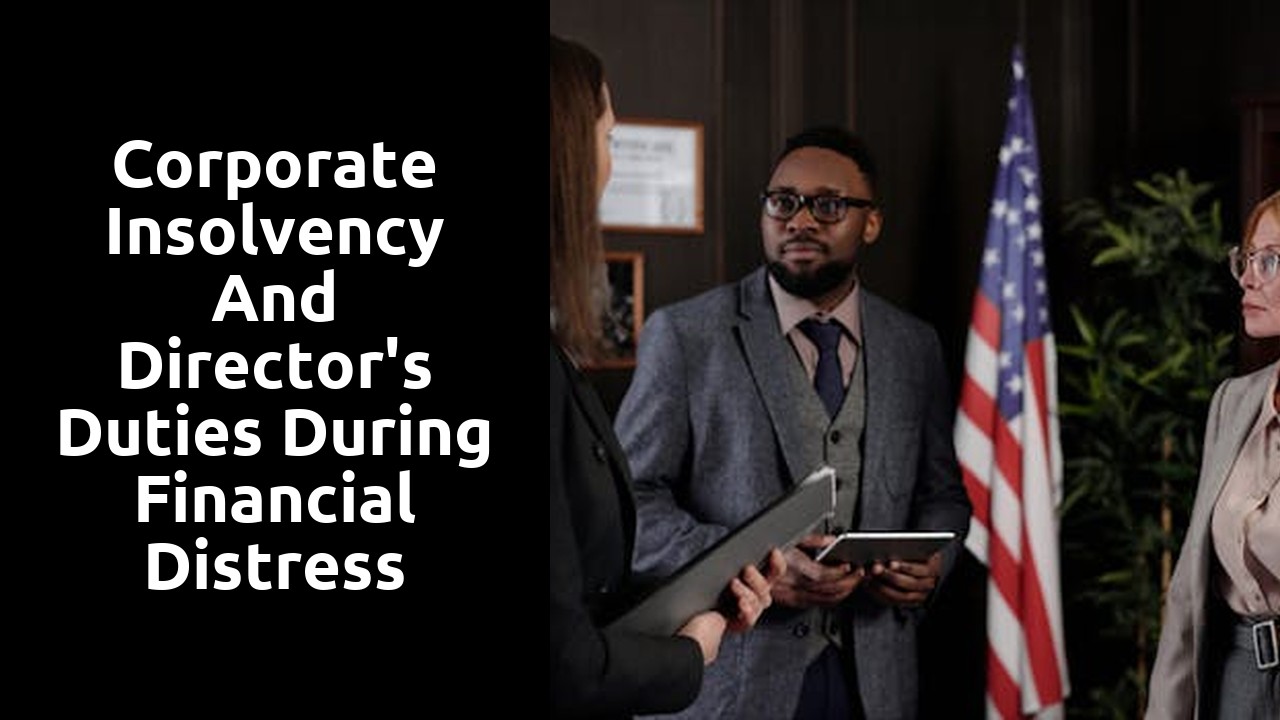Corporate Insolvency and Director's Duties during Financial Distress

Navigating Challenging Financial Times: A Guide for Corporate Leaders
In today's fast-paced and volatile business environment, corporate leaders are often faced with the daunting task of navigating through challenging financial times. The impact of financial distress on director responsibilities cannot be underestimated, as leaders are expected to adapt and make tough decisions that can greatly affect the future of their organizations. In such times, it is crucial for leaders to understand their legal obligations and responsibilities, ensuring that they act ethically and in the best interest of all stakeholders involved.
The Impact of Financial Distress on Director Responsibilities
In times of financial distress, the responsibilities of directors carry even greater weight. Directors are tasked with navigating the challenges and uncertainties that arise during such turmoil, while still upholding their fiduciary duties to the company and its stakeholders. They are expected to make informed decisions that can help mitigate the impact of the crisis and ensure the long-term sustainability of the organization.
One key aspect of director responsibilities during financial distress is the duty of care. Directors must exercise reasonable care, skill, and diligence in managing the affairs of the company. This includes staying informed about the financial health of the organization, monitoring its performance, and seeking professional advice when necessary. Directors should also be proactive in identifying and addressing any potential risks or issues before they escalate. By fulfilling their duty of care, directors can help mitigate the effects of financial distress and protect the interests of the company and its stakeholders.
Legal Obligations in Times of Business Turmoil
One of the key legal obligations that corporate leaders have during times of business turmoil is to ensure compliance with all applicable laws and regulations. This includes maintaining accurate financial records, filing required reports with regulatory bodies, and fulfilling tax obligations. Failure to adhere to these legal requirements can have serious consequences, ranging from financial penalties to criminal charges. Therefore, it is imperative for directors to stay informed about the evolving legal landscape and to seek appropriate legal counsel when necessary.
In addition, directors have a fiduciary duty to act in the best interests of the company and its stakeholders. This duty requires directors to exercise reasonable care, skill, and diligence in making decisions that affect the company's financial well-being. Directors must prioritize the long-term viability of the business and consider the potential impact of their decisions on employees, shareholders, creditors, and other relevant parties. It is crucial for directors to be proactive in identifying and addressing potential risks and to carefully assess the consequences of their actions in light of the company's financial situation.
Understanding the Duties of Directors when Company Finances are Strained
Understanding the Duties of Directors when Company Finances are Strained
Directors play a crucial role in navigating the complex landscape of company finances during challenging times. When financial distress strikes, it is essential for directors to understand their duties and obligations to ensure the best interests of the company and its stakeholders are protected.
First and foremost, directors have a fiduciary duty to act in the best interests of the company. This means they must make decisions that are aimed at maximizing the company's long-term value and financial stability. In times of financial strain, directors must carefully analyze the company's financial position, identify potential risks and opportunities, and make informed decisions to mitigate the impact of the crisis. They must prioritize the long-term sustainability of the company, even if it means making tough choices such as cost-cutting measures or restructuring. The duty of loyalty also requires directors to avoid conflicts of interest and to prioritize the interests of the company over their personal gain.
Balancing Stakeholder Interests during Economic Uncertainty
Balancing the interests of stakeholders during times of economic uncertainty is an immense challenge for corporate leaders. Stakeholders, including employees, shareholders, customers, and suppliers, each have their own unique concerns and expectations. It is crucial for leaders to carefully navigate these competing interests to ensure a fair and equitable approach that promotes long-term success for the organization.
One of the key ways to achieve this balance is through effective communication with stakeholders. By openly and transparently sharing information about the company's financial situation, leaders can help stakeholders understand the challenges being faced and the steps being taken to address them. This can help alleviate anxiety and maintain trust, as stakeholders will feel informed and involved in the decision-making process. Additionally, leaders must actively listen to the concerns and feedback of stakeholders, taking their perspectives into account when making important decisions. By incorporating the input of stakeholders, leaders can better align the company's actions with their interests, fostering a sense of collaboration and shared ownership in overcoming economic uncertainty.
Strategies for Effective DecisionMaking amidst Financial Crisis
In times of financial crisis, effective decision-making is crucial for corporate leaders. The decisions made during these challenging times can have a lasting impact on the future of the company. Therefore, it is important for leaders to approach decision-making with careful consideration and a well-defined strategy.
One strategy for effective decision-making amidst a financial crisis is to gather as much relevant information as possible. This includes analyzing financial data, market trends, and potential risks and opportunities. By having a comprehensive understanding of the situation, leaders can make more informed decisions that are based on facts rather than intuition. Additionally, involving key stakeholders, such as board members and senior executives, in the decision-making process can provide valuable insights and perspectives that can help enhance the quality of the decisions made.
Related Links
Director's Duties in Management of Company Assets and ResourcesOverview of Director's Duties and Responsibilities in Corporate Law
Regulatory Compliance and Directors' Responsibilities
Role of Directors in Financial Reporting and Transparency
Legal Obligations of Directors in Corporate Governance
Director's Duty of Loyalty and Avoiding Conflicts of Interest
Directors' Liability and Protection under Corporate Law